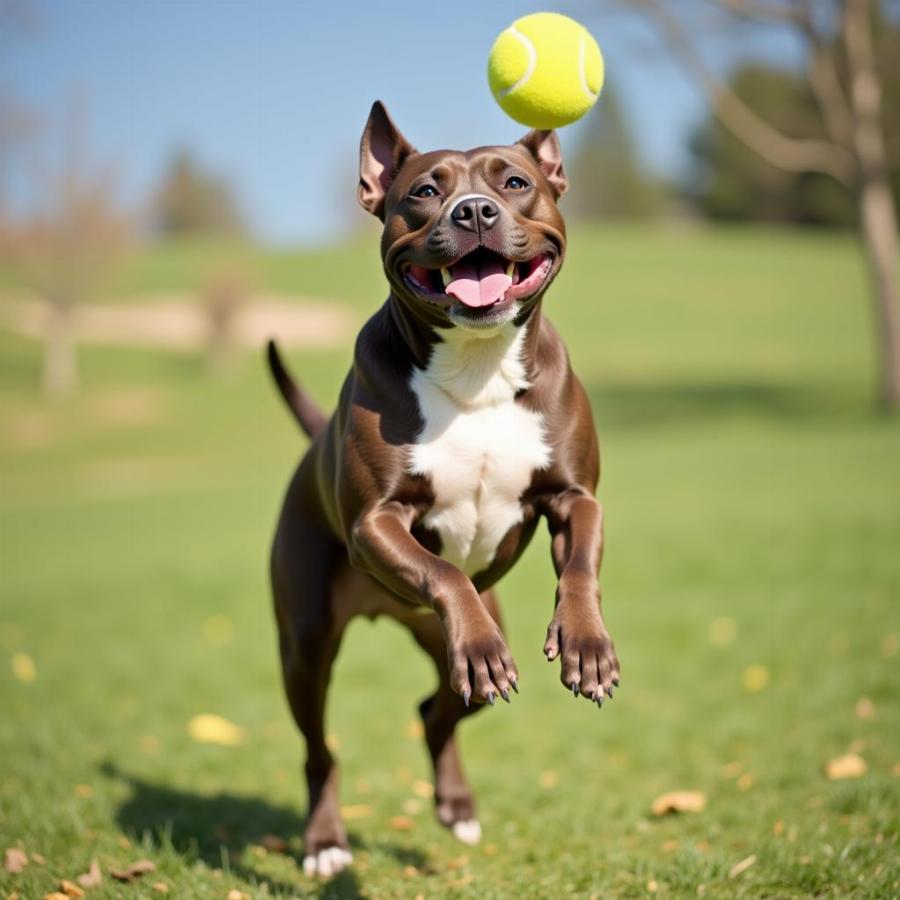The image of a pitbull dog with muscles is often met with mixed reactions. Some see power and athleticism, while others may feel apprehensive. This article delves into the reality behind those powerful physiques, exploring their origins, the role of genetics and exercise, and what responsible ownership entails. We’ll separate fact from fiction, providing you with a comprehensive understanding of these often-misunderstood canines.
Built for Strength: A Look at the Pitbull’s Physique
The American Pitbull Terrier, commonly known as the Pitbull, is a breed known for its muscular build. It’s not just about looks; their physique is rooted in their history. Originally bred for bull-baiting and bear-baiting, these dogs needed strength, agility, and stamina to succeed in these now-outlawed activities.
Over time, responsible breeders shifted their focus, prioritizing temperament and companionship. However, the genetic predisposition for a muscular physique remains.
Genes vs. Gym: Factors Influencing Muscle Development
While genetics lay the foundation for a Pitbull’s muscular build, several factors influence how those muscles develop:
- Genetics: Just like some humans are naturally more muscular, genetics play a significant role in a Pitbull’s muscle mass.
- Nutrition: A balanced diet rich in protein and essential nutrients fuels muscle growth and development.
- Exercise: Regular, active exercise is crucial, not only for building muscle but also for their overall health and well-being.
It’s important to remember that forcing excessive muscle growth through rigorous training or specialized diets can be detrimental to their health, potentially leading to joint problems and other health issues.
Responsible Ownership: Caring for Your Muscular Companion
Owning a Pitbull, especially one with a muscular build, comes with great responsibility. Here’s what you need to know:
- Socialization: Early and ongoing socialization is crucial. Expose your Pitbull to various people, dogs, and environments to help them develop into well-adjusted dogs.
- Training: Consistent training using positive reinforcement methods is vital. Pitbulls are intelligent and eager to please, making them highly trainable.
- Exercise: Ensure your Pitbull gets plenty of exercises, both physical and mental. This helps prevent boredom and destructive behaviors.
 Pitbull Playing Fetch in the Park
Pitbull Playing Fetch in the Park
Busting Myths: The Truth About Pitbulls and Aggression
Unfortunately, Pitbulls are often stereotyped as aggressive dogs. It’s crucial to remember that aggression is a behavioral issue, not a breed-specific trait. Any dog, regardless of breed, can exhibit aggression if not properly trained, socialized, and cared for.
Responsible Pitbull owners understand the importance of:
- Spaying/Neutering: This can help reduce hormone-driven aggression.
- Never Leaving Your Dog Unattended with Children: Always supervise interactions between dogs and children, regardless of breed.
- Knowing Dog Body Language: Recognize the signs of stress and anxiety in dogs to prevent potential incidents.
Beyond the Muscles: Appreciating the Pitbull’s True Nature
While their muscular physique might be the first thing you notice, Pitbulls have so much more to offer. They are known for their intelligence, loyalty, and affectionate nature.
“Pitbulls, when raised with love and consistency, are incredibly loyal and affectionate dogs. Their capacity for love is as impressive as their physical strength,” says renowned dog trainer, Sarah Williams.
Conclusion
Understanding the pitbull dog with muscles goes beyond admiring their impressive physique. It’s about appreciating their history, recognizing the factors that influence their development, and embracing the responsibility that comes with owning one. By dispelling myths and promoting responsible ownership, we can help these incredible dogs live happy, healthy lives.
Remember, a well-adjusted, well-loved Pitbull can be an amazing companion, bringing joy and loyalty to your life for years to come.
FAQs about Pitbulls with Muscles
Q: Are Pitbulls naturally aggressive due to their muscular build?
A: No, aggression is a behavioral issue, not a breed-specific trait. Any dog, regardless of breed, can exhibit aggression if not properly trained and socialized.
Q: What kind of exercise is best for a muscular Pitbull?
A: A combination of physical exercise (walks, runs, playtime) and mental stimulation (puzzle toys, training sessions) is ideal.
Q: Do Pitbulls need a special diet to maintain their muscles?
A: A balanced diet that’s rich in protein and formulated for their age and activity level is sufficient. Consult your vet for specific dietary recommendations.
Q: Are Pitbulls good with children?
A: With proper socialization and training, Pitbulls can be good with children. However, supervision is always crucial, as with any breed.
Q: Where can I find a reputable breeder if I’m interested in getting a Pitbull?
A: Contact the American Kennel Club (AKC) or the United Kennel Club (UKC) for referrals to reputable breeders in your area.
Looking for more information on Pitbulls or other dog breeds? Visit Beaut Dogs for expert advice, breed guides, and everything you need to know about responsible dog ownership.
Beaut Dogs is your trusted source for all things dog-related. We provide reliable, helpful, and in-depth information about the wonderful world of dogs. Need personalized advice? Email us at [email protected]. We’re here to help!